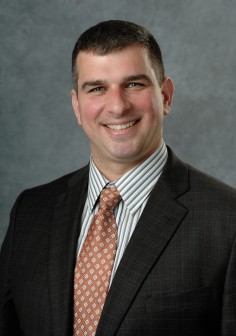Michigan State University AgBioResearch Engineer Dana Kirk grew up working on his family’s dairy farm “running around scooping manure,” while simultaneously developing a curiosity for the symbiotic relationship farming has with the environment.

Kirk’s interests blossomed into an academic career focused on the development and implementation of waste management systems and waste-to-energy systems for dairy operations. His ultimate goal is to maximize farm production and profitability while preserving and protecting natural resources and ensuring environmental sustainability.
“The issues our work aims to address have always been near and dear to me as someone raised on a family dairy farm. I am also an avid outdoorsman and outdoor swimmer,” said Kirk, associate professor in the Department of Biosystems and Agricultural Engineering. “It’s important we continue to develop and enhance agricultural practices that maintain a good relationship with the environment. To do that we are seeking methods to better utilize all of our resources, and find ways to reinvest in those resources.”
Kirk routinely partners with government and commodity organizations — such as the Michigan Department of Agriculture and Rural Development, Michigan Farm Bureau and Michigan Department of Environment, Great Lakes and Energy — to develop training and programming that supports waste system management and manure management for dairy farms of all sizes. Kirk prioritizes applied research focused on responding to the emerging needs of dairy producers in Michigan and across the country.
“One of the biggest things we advocate for at Michigan Farm Bureau is the need, and the ability, of faculty at MSU to conduct research that’s important to the dairy industry,” said Laura Campbell, senior conservation and regulatory relations specialist with Michigan Farm Bureau. “Dana is a great partner, because he not only conducts the research that responds to industry needs, but he’s also able to lead many of the educational programs and share information directly with farmers and with agricultural organizations like Farm Bureau.”
To read the full story, visit the College of Agriculture and Natural Resources website.
About the MSU Innovation Center:
The MSU Innovation Center is dedicated to fostering innovation, research commercialization, and entrepreneurial activities from the research and discovery happening across our campus every day. We act as the primary interface for researchers aiming to see their research applied to solving real-world problems and making the world a better place to live. We aim to empower faculty, researchers, and students within our community of scholars by providing them with the knowledge, skills, and opportunities to bring their discoveries to the forefront. Through strategic collaborations with the private sector, we aim to amplify the impact of faculty research and drive economic growth while positively impacting society. We foster mutually beneficial, long-term relationships with the private sector through corporate-sponsored research collaborations, technology licensing discussions, and support for faculty entrepreneurs to support the establishment of startup companies.
Is your company interested in working with MSU’s College of Agriculture and Natural Rescources? Click Here.
